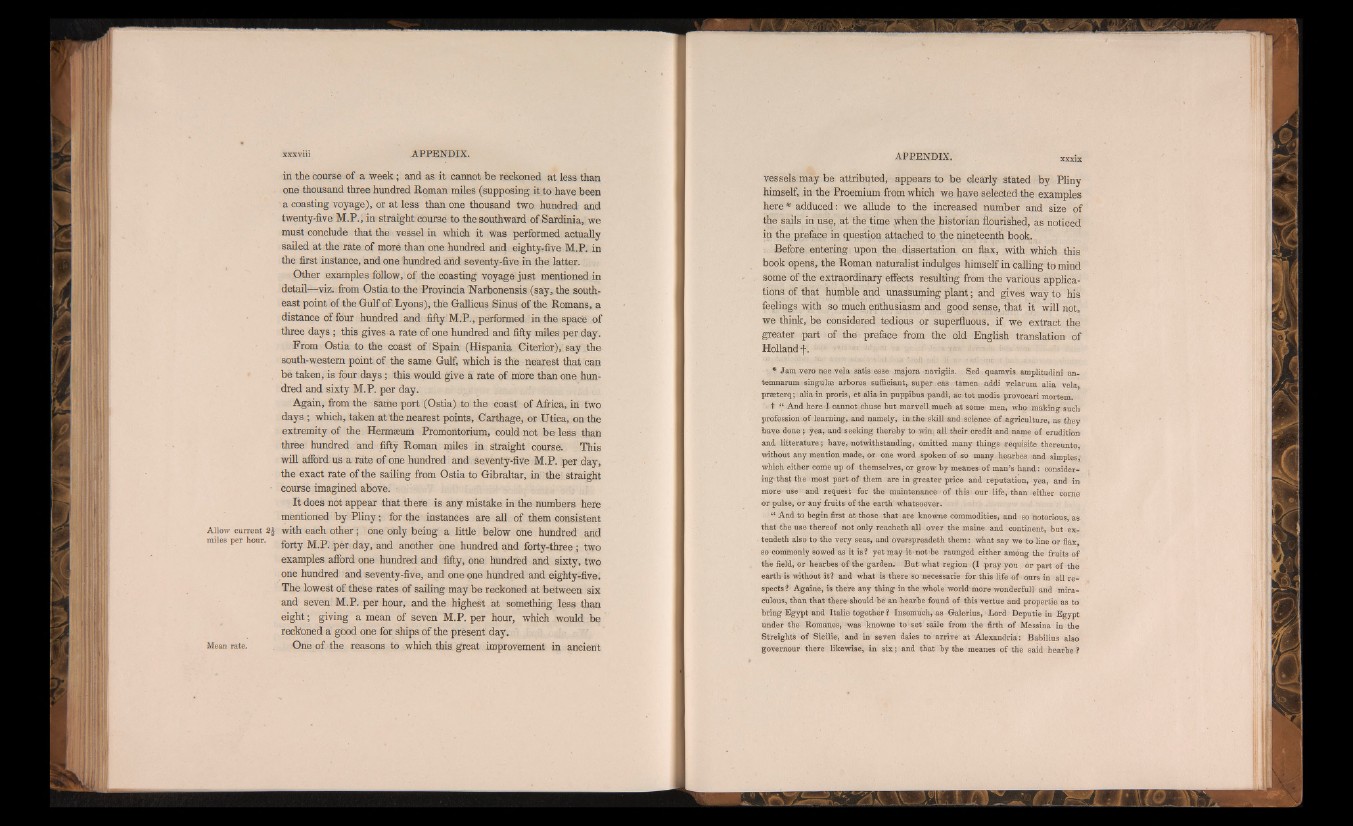
in the course of a w e e k ; and as it cannot b e reckoned at less than
one thousand three hundred Roman miles (supposing it to have been
a coasting voyage), or at less than one thousand two hundred and
twenty-five M.P ., in straight course to the southward of Sardinia, we
must conclude that the vessel in which it Was performed actually
sailed at the rate of more than one hundred and eighty-five M.P. in
the first instance, and one hundred and seventy-five in the latter.
Other examples follow, of the coasting voyage ju st mentioned in
detail—viz. from Ostia to the Provincia Narbonensis (say, the southeast
point of the Gulf o f Lyons), the Gallicus SinuS of the Romans, a
distance of four hundred and fifty M.P., performed in the space of
three days ; this gives a rate of one hundred and fifty miles per day.
From Ostia to the coast of Spain (Hispania Citerior), say the
south-western point of the same Gulf, which is the nearest that can
be taken, is four d a y s ; this would give a rate of more than one hundred
and sixty M.P. per day.
Again, from the same port (Ostia) to the coast of Africa, in two
days ; which, taken at the nearest points, Carthage, or Utica, on the
extremity of the Hermseum Promontorium, could not b e less than
three hundred and fifty Roman miles in straight course. This
will afford us a rate o f one hundred and seventy-five M.P. per day,
the exact rate of the sailing from Ostia to Gibraltar, in the straight
course imagined above.
I t does not appear th a t there is any mistake in the numbers here
mentioned by P lin y ; for the instances are all of them consistent
Allow current 2§ with each o th e r; one only being a little below one hundred and
miles per hour. f o r t y M.P. per day, and another one hundred and forty-three; two
examples afford one hundred and fifty, one hundred and sixty, two
one hundred and seventy-five, and one one hundred and eighty-five.
The lowest of these rates of sailing may be reckoned at between six
and seven M.P. per hour, and the highest a t something less than
e ig h t; giving a mean of seven M.P. per hour, which would be
reckoned a good one for ships of the present day.
Mean rate. One of the reasons to which this great improvement in ancient
vessels may be attributed, appears to be clearly Stated by Pliny
himself, in th e Proemium from which we have selected the examples
h e re* adduced: we allude to the increased number and size of
the sails in use, at the time when the historian flourished, as noticed
in the preface in question attached to the nineteenth book.
Before entering upon the dissertation on flax, with which this
book opens, the Roman naturalist indulges himself in calling to mind
some of the extraordinary effects resulting from the various applications
of that humble and unassuming plant ; and gives way to his
feelings with so much enthusiasm and good sense, that it will not,
we think, be considered tedious or superfluous, if we extract the
greater part of the preface from the old English translation of
Holland j-.
* Jam vero nee vela satis esse majora navigiis. S.ed quamvis amplitudini an-
temnarum singulæ arbores sufficiant,. super eas tamen addi yelarum alia vela,
præterq; alia in promis, et alia in puppibus pandi, sic tot modis provocari mortem.
t “ And here I cannot chuse but marvell much at some men, who making such
profession of learning, and namely, in: the skill and science of agriculture, as they
have done ; yea, and seeking thereby to win, all their credit and name of erudition
and, littérature ; have, notwithstanding, omitted many things requisite thereunto
without any mention made, or. one word .spoken of.so many hearbes and simples,'"
which either come up of themselves, or grow by meanes of man’s hand: considering
that the 'most part of' them are in greater price and reputation, yea, and in
more use and request for the maintenance of this our life, than either come
Or pulse, or anv fruits of the earth whatsoever.
“ And to begin first at those that are knowne commodities, and so notorious as
that the use thereof not only reacheth all over the maine and continent, but ex-
tendeth also to the very seas, and overspreadeth them: what say we to line or flax
so commonly sowed as it is? yet may it-not’be raunged either among the fruits of
the field, or hearbes of the garden. But what region (I pray you. or part of the
earth is without it? and what is there so necessarie for this life of ours in all respects?
Againe, is therfe any thing in the whole world more wonderful! and miraculous,
than that there1 should be' an hearbe found of this -vertue and propertie as to
bring Egypt and Italie together ? Insomuch, as Galerius, Lord Deputie in Egypt
under the Romanes, was knowne to set salle from the firth of Messina in the
Streights of Sicilie, and in seven daies to arrive at Alexandria: Babilius also
governour there likewise, in six ; and that by the meanes of the said hearbe ?